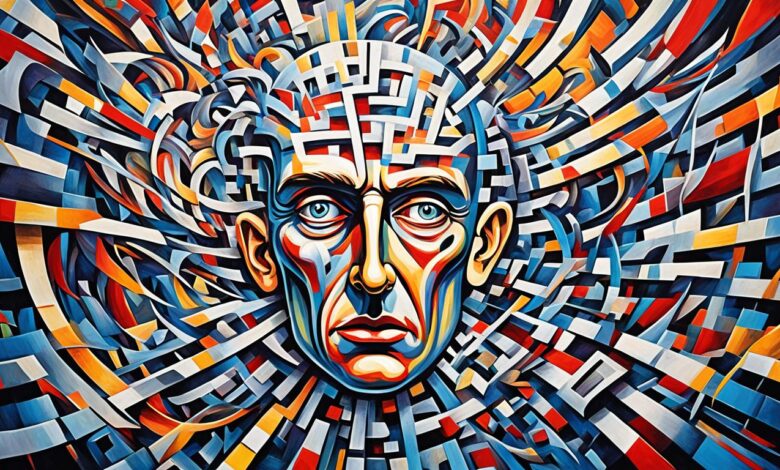Understanding Psychosis in Bipolar Disorder

When reality and illusion start to blur, we must deeply understand psychosis. But what if this twist involves swings of mania and depression? In bipolar disorder, psychosis adds complexity. It requires deep comprehension. While exploring psychosis in bipolar disorder, we explore the human mind’s deepest mysteries.
Defining Psychosis and Its Occurrence in Bipolar Disorder
When we talk about mental health, especially bipolar disorder, we often hear about psychosis. This symptom changes how people think and see the world. In understanding psychosis, we shed light on what those with bipolar disorder go through. This calls for more awareness and empathy.
What is Psychosis?
Psychosis means losing touch with reality. People with psychosis might believe things that aren’t true or see things others don’t see. It happens in bipolar disorder during very high or very low moods, making reality hard to grasp. This can be scary and confusing for those going through it.
Prevalence and Demographics
It’s important to know how common psychosis is in bipolar disorder. Research shows it varies, affecting 15 to 100 out of every 100,000 people each year. Psychosis doesn’t care about who you are—anyone can experience it, often starting in young adulthood. But, it can actually start at any time in life.
If you see signs of psychosis or bipolar disorder, getting help is the first step. Being informed helps us care better for those affected. This is why we need to keep talking about it in our communities.
Identifying Symptoms of Bipolar Disorder Psychosis
People with bipolar disorder can sometimes experience psychosis. This affects their behavior, how they see the world, and their grasp on reality. It’s crucial to notice these signs early for the right help and care.
Distinguishing Delusions from Reality
One key symptom of bipolar disorder psychosis is having delusions. These are beliefs that don’t match up with reality. Understanding that these beliefs are not true helps in treating and responding to their condition.
Recognizing Hallucinations
Hallucinations are major signs of psychosis. They mean hearing, seeing, or feeling things that aren’t there. Often, those with bipolar disorder might hear voices without anyone talking. Spotting these signs early is crucial to prevent more distress.
Observing Behavioral Changes
Changes in behavior can also signal psychosis. Watch for shifts in how active they are, their interest in being with others, or in taking care of themselves. For example, not caring about personal hygiene could mean a psychotic episode is starting. Paying attention to these changes is important for quick intervention.
Knowing these symptoms—distinguishing delusions, recognizing hallucinations, and noticing behavior shifts—is vital. It helps those affected and guides caregivers and doctors towards the right care.
What to Know About Psychosis in Bipolar Disorder
Understanding psychosis in bipolar disorder is vital for everyone involved. It sets the foundation for personalized care. It makes us see the big picture, including its impact on emotions, relationships, and daily functions.
The reach of psychosis in bipolar disorder goes far, affecting all areas of life. Emotional problems can lead to feeling alone, scared, and confused. This can hurt relationships with friends, family, and coworkers. It also affects how a person manages work and takes care of themselves.
Noticing psychosis signs early is crucial in treatment. Education about symptoms like false beliefs and seeing things helps. This helps everyone involved to react quickly, getting the right support early on.
Effective treatment is key in dealing with bipolar psychosis. This might include medication and therapy to improve mental strength. It’s all about a sustained effort. This involves smart decisions and a solid support circle.
| Aspect of Life | Impact of Bipolar Psychosis |
|---|---|
| Emotional Well-being | Increased isolation, fear, and confusion during psychotic episodes. |
| Relationships | Strain on personal and professional relationships due to unpredictable behaviors. |
| Overall Functioning | Decreased performance in work and challenges in daily self-care and routine activities. |
| Early Detection and Treatment | Crucial for reducing the long-term impact and improving prognosis. |
To support people with bipolar psychosis, a comprehensive approach is needed. This starts with knowing about the condition. Then, it involves applying the right treatments and skills. It’s all about fostering an educated, caring, and active community.
Deciphering the Causes Behind Psychosis in Bipolar Disorder
Looking into why people with bipolar disorder experience psychosis is complex. Many factors play a part. Scientists have pinpointed some key elements that contribute to its development. Still, the search for answers goes on.
Genetic and Neurological Factors
Genetic factors are crucial in determining who might get bipolar disorder. It’s more common in those with a family history of the disease. Specific genes related to how neurons communicate and change have been linked to the risk. Thanks to advances in genetic research, we’re learning more about these connections.
These discoveries help us understand how bipolar disorder develops. They also offer hope for new ways to treat it. By focusing on these genetic insights, we might find targeted therapies in the future.
Environmental and Lifestyle Influences
The world around us and how we live can also affect bipolar disorder and psychosis. Things like stress, tough life events, drugs, and not sleeping well play a role. These could start or make the disorder worse. This shows how our genes and our choices or circumstances work together to influence health.
This mix of nature and nurture highlights the complexity of bipolar disorder. It’s a puzzle where both our genetic makeup and life experiences fit together to affect our mental health.
Diagnosing Psychosis in Bipolar Disorder
Finding out if someone has bipolar disorder can be tricky. Doctors need to be very careful to spot the signs of bipolar psychosis correctly. It’s very important to look closely at all the details. This way, doctors can be sure they are making the right call. Getting it right early matters a lot. It helps them pick the best way to help the person.
Assessment Techniques
To figure out if someone has psychosis in bipolar disorder, doctors use different methods. They talk deeply with the person about what they’re going through. This includes their feelings and how they act. They also use surveys that the person fills out themselves.
And, they do tests that check how the person’s mind works. This gives them clear facts to help understand the person’s condition better.
Challenges of Accurate Diagnosis
Finding the correct diagnosis of bipolar disorder can be hard. Signs of the illness can look a lot like other mental health problems. This includes schizophrenia or depression with psychosis.
Also, wrong ideas about psychosis in society can make things harder. These can change how people talk about their symptoms. They also affect how doctors figure out what’s wrong. This makes it really tough to know for sure if it’s bipolar disorder.
Understanding Bipolar Psychosis Treatment Options
Managing bipolar disorder, especially bipolar psychosis, demands an effective treatment plan. This plan usually combines medication and therapy. Each plan is made to fit the person’s needs.
Medication Management
Mood stabilizers and antipsychotic meds are crucial for treating bipolar psychosis. They help reduce symptoms and prevent coming back. By regulating these meds, mood swings and psychotic symptoms like delusions can be controlled. This is vital for mental balance and better life quality.
Therapeutic Interventions
Therapy is as important as medication. It helps people understand themselves, learn coping skills, and grow. Cognitive-behavioral therapy (CBT) changes negative thoughts and actions. Psychoeducation teaches patients and families about bipolar disorder. This knowledge helps in handling the disorder better.
Medications and therapy together are best for bipolar psychosis. They lead to recovery and help manage it long-term.
A plan that combines medicine and therapy is best. It must be made just for the person. This way, it faces all aspects of the disorder.

Comparing Bipolar and Schizophrenia Psychosis
Bipolar disorder and schizophrenia both involve psychosis, but they are different. It’s vital for doctors to understand these differences. This helps them diagnose and treat each person correctly.
Differentiating Symptoms
Bipolar psychosis and schizophrenia psychosis have a key difference. It’s all about when and in what situation the symptoms happen. Bipolar disorder’s psychotic symptoms are linked to mood changes. For instance, during a manic phase, someone might have extreme and unrealistic beliefs about their power. However, when they are depressed, they might feel extreme guilt or worthlessness. But schizophrenia’s symptoms don’t depend as much on mood and can include ongoing hallucinations or confused thinking.
Diagnostic Criteria and Approaches
The DSM-5 guide helps doctors tell the difference between psychosis in bipolar disorder and schizophrenia. For schizophrenia, a person’s mood symptoms must be minimal. But for bipolar disorder, mood swings and psychotic symptoms happen together. This is key for a correct diagnosis.
Doctors must carefully check a patient’s medical history and symptoms. They need to see how mood changes and psychotic episodes are connected. This ensures they can diagnose and treat the patient properly.
Advancements in Psychosis in Bipolar Disorder Research
Scientists are making great strides in bipolar psychosis research. They aim to better manage this condition. Their hard work is leading to new treatments and a deeper understanding of the disorder.
Innovations in Treatment Research
The way we treat bipolar psychosis is changing fast. Researchers are developing new medications with fewer side effects. They are also looking at combining drugs and therapy to better fit each person’s needs. This approach hopes to improve life for those with bipolar psychosis.
Developments in Understanding the Pathophysiology
There are also big steps being made in understanding bipolar psychosis. Studies are diving into the brain changes and genetics involved. Using advanced technology, scientists want to find early signs of the disorder. They’re getting closer to uncovering the mysteries of bipolar psychosis.
Coping Strategies for Managing Bipolar Psychosis
Living with bipolar disorder involves dealing with tough psychotic episodes. This requires resilience and a proactive stance. Effective coping strategies are key to handle bipolar psychosis. They lessen the intensity of episodes. Plus, they empower people to live fully. Having strong support and using community resources are crucial.

Lifestyle Adaptations
Everyday life poses challenges for those with bipolar psychosis. They need to adapt in ways that boost stability. Lifestyle adaptations prevent trigger events and manage stress. This is crucial for bipolar management. Healthy habits, structured routines, good sleep, and exercise promote wellness and manage symptoms.
Support Systems and Community Resources
For those fighting bipolar psychosis, having a strong support system is essential. Family, friends, and mental health pros provide vital care. Community resources offer information, care access, and sharing forums. This enriches the management toolkit for bipolar psychosis.
| Coping Strategy | Description | Benefits |
|---|---|---|
| Regular Therapy Sessions | Engagement with a therapist for personalized management plans. | Provides professional guidance, emotional support, and ongoing monitoring. |
| Mindfulness and Relaxation Techniques | Practices such as meditation, deep breathing, and yoga. | Reduces stress, improves mood stability, and promotes mental clarity. |
| Peer Support Groups | Groups where individuals share experiences and strategies. | Creates a sense of community, reduces isolation, and facilitates learning from others’ experiences. |
| Healthy Sleep Patterns | Maintaining a consistent sleep schedule and good sleep hygiene. | Improves overall mental health and reduces the likelihood of psychosis episodes. |
| Structured Daily Routine | A clearly defined daily schedule with set times for activities and rest. | Provides predictability and a sense of control, which is reassuring during manic or depressive episodes. |
Conclusion
Bipolar disorder is a complex journey that emphasizes the role of understanding psychosis. Knowing this aspect is critical for good mental health care. The challenges and successes are woven into a story for those struggling with bipolar psychosis. Managing this condition well needs medical knowledge, kindness, and a smart plan.
Key to improving life for people with bipolar psychosis is recognizing symptoms early. Getting the right diagnosis and treatment aids in creating stability and moving towards getting better. By focusing on the unique experiences of each patient, mental health care can pave the way to recovery, taking into account their individual needs.
Research and new treatment methods are expanding our support for bipolar psychosis. Each discovery helps refine how we help patients, blending more expertise and understanding into care. This combination of science and personalized care is sparking hope for a better future for those dealing with this complex issue.






